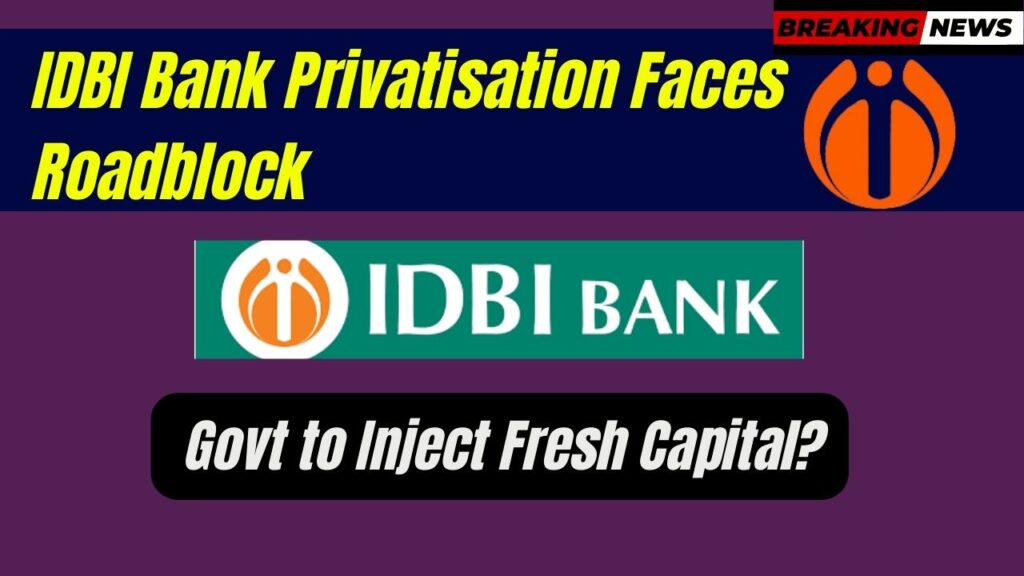IDBI Bank Privatisation Faces Roadblock – Privatisation of IDBI Bank has been a hot topic in India’s financial sector. However, recent developments suggest that the process is facing delays. The government, in partnership with the Life Insurance Corporation of India (LIC), is looking for a strategic buyer but is now encountering unexpected challenges. Will the government inject fresh capital to make the deal more attractive? Let’s break it down in detail.

IDBI Bank Privatisation Faces Roadblock
| Aspect | Details |
|---|---|
| Privatisation Progress | Expected to be finalized by March 2025 |
| Government’s Stake | 30.48% (with LIC holding 49.24%) |
| Financial Bids | To be invited soon |
| Capital Infusion | No plans confirmed by the government |
| Challenges | Regulatory approvals, bidder concerns, employee transition |
| Impact on Employees | Job security, transition policies, and possible restructuring |
| Impact on Customers | Improved service efficiency, potential product changes, digital transformation |
| Source | Official LIC Website |
IDBI Bank’s privatisation is progressing despite roadblocks. The government has no plans to inject fresh capital, and bidders remain cautious due to regulatory and financial concerns. If resolved successfully, this move could reshape India’s banking sector, leading to more efficient financial services and improved market confidence.
What is IDBI Bank Privatisation?
The Government of India (GOI) and LIC collectively hold nearly 97.75% of IDBI Bank. To encourage private investment and improve efficiency, the government initiated the privatisation process in January 2023. The goal is to bring in a private player who can transform the bank into a more profitable and customer-focused entity.
Why is the Government Selling IDBI Bank?
- Reducing fiscal burden – The government wants to lessen its financial responsibilities in managing public sector banks.
- Improving efficiency – Private entities often introduce better governance, management practices, and technological advancements.
- Boosting banking sector growth – Increased competition can strengthen the overall banking industry and financial inclusion.
- Global Investment Opportunity – Attracting foreign and domestic investors could enhance the bank’s market credibility.
Key Roadblocks in IDBI Bank’s Privatisation
Despite initial enthusiasm, several hurdles have slowed down the process:
Regulatory Approvals
Potential buyers require clarity on post-acquisition regulatory restrictions. The Reserve Bank of India (RBI) has strict guidelines regarding ownership structures, compliance requirements, and capital adequacy norms.
Concerns Over Non-Performing Assets (NPAs)
While IDBI Bank has reduced its NPA ratio in recent years, investors remain cautious about any hidden risks in its loan portfolio.
Lack of Bidders?
The response from potential investors has been lukewarm, likely due to concerns over operational control and financial viability.
Employee Job Security & Transition Policies
Trade unions and employee associations have raised concerns about potential layoffs, new management policies, and post-privatisation restructuring.
Impact on Customers
Customers may experience improved banking services and new financial products, but changes in interest rates, loan approval policies, and service fees remain uncertain.
Will the Government Inject Fresh Capital?
Currently, the government has no plans to inject additional capital into IDBI Bank. Officials have confirmed that once privatisation is complete, financial responsibility will shift entirely to the new owner. (Source)
Possible Government Strategies to Attract Buyers
- Offering tax incentives and reducing regulatory constraints.
- Allowing bidders to acquire a larger stake for better control.
- Implementing an employee-friendly transition strategy to maintain stability.
How Do Other Countries Handle Bank Privatisation?
Globally, privatisation of state-owned banks has been implemented in several ways:
- United States – Uses mergers and acquisitions to consolidate weak banks with strong private institutions.
- United Kingdom – Adopted a gradual stake dilution approach while privatising Royal Bank of Scotland (RBS).
- China – Implements partial privatisation, retaining state control while allowing private capital inflows.
Additional Challenges Hindering the Process
Legal and Bureaucratic Delays
Government approvals, inter-departmental coordination, and compliance verification often slow down large-scale privatisation.
Investor Skepticism on Bank Valuation
Investors seek accurate asset valuation and guarantees that there will be no undisclosed liabilities post-acquisition.
Possible Political Influence
Privatisation of a major bank could face political pushback from opposition parties and worker unions.
What Happens Next?
Despite challenges, the privatisation process remains on track. The final share purchase agreement is expected by March 2025. If regulatory concerns are resolved, financial bids will be invited, paving the way for a successful transaction.
IDBI Bank Junior Assistant Manager PGDBF Online Form 2025 – Apply For 650 Post
IDBI Bank Junior Assistant Manager PGDBF 2025: Online Application Details
IDBI Bank JAM DV & Interview Call Letter 2025 Out – Check Your Schedule!
FAQs
1. Why is the government privatising IDBI Bank?
The government seeks to reduce its fiscal burden, improve efficiency, and attract private investment.
2. When will IDBI Bank’s privatisation be completed?
The share purchase agreement is set to be finalized by March 2025, followed by financial bids.
3. Will there be any layoffs after privatisation?
Although not confirmed, employee restructuring is a common practice post-privatisation. The government might negotiate transition plans.
4. What happens to IDBI Bank’s customers post-privatisation?
Services are expected to improve, but certain policies like interest rates and charges could change under new ownership.
5. Who are the likely bidders for IDBI Bank?
While no official bidders have been disclosed, global banking firms, domestic financial institutions, and private equity players may express interest.
6. Can privatisation be reversed?
Reversing privatisation is highly unlikely unless the government decides to repurchase stakes in the future.
7. How does IDBI Bank’s privatisation impact India’s banking sector?
Privatisation could enhance banking efficiency, introduce new financial products, and promote healthy competition in the banking industry.







